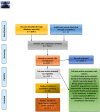A systematic review of intimate partner violence interventions focused on improving social support and/ mental health outcomes of survivors
- PMID: 32584910
- PMCID: PMC7316294
- DOI: 10.1371/journal.pone.0235177
A systematic review of intimate partner violence interventions focused on improving social support and/ mental health outcomes of survivors
Abstract
Background: Intimate partner violence (IPV) is a key public health issue, with a myriad of physical, sexual and emotional consequences for the survivors of violence. Social support has been found to be an important factor in mitigating and moderating the consequences of IPV and improving health outcomes. This study's objective was to identify and assess network oriented and support mediated IPV interventions, focused on improving mental health outcomes among IPV survivors.
Methods: A systematic scoping review of the literature was done adhering to PRISMA guidelines. The search covered a period of 1980 to 2017 with no language restrictions across the following databases, Medline, Embase, Web of Science, PROQUEST, and Cochrane. Studies were included if they were primary studies of IPV interventions targeted at survivors focused on improving access to social support, mental health outcomes and access to resources for survivors.
Results: 337 articles were subjected to full text screening, of which 27 articles met screening criteria. The review included both quantitative and qualitative articles. As the focus of the review was on social support, we identified interventions that were i) focused on individual IPV survivors and improving their access to resources and coping strategies, and ii) interventions focused on both individual IPV survivors as well as their communities and networks. We categorized social support interventions identified by the review as Survivor focused, advocate/case management interventions (15 studies), survivor focused, advocate/case management interventions with a psychotherapy component (3 studies), community-focused, social support interventions (6 studies), community-focused, social support interventions with a psychotherapy component (3 studies). Most of the studies, resulted in improvements in social support and/or mental health outcomes of survivors, with little evidence of their effect on IPV reduction or increase in healthcare utilization.
Conclusion: There is good evidence of the effect of IPV interventions focused on improving access to social support through the use of advocates with strong linkages with community based structures and networks, on better mental health outcomes of survivors, there is a need for more robust/ high quality research to assess in what contexts and for whom, these interventions work better compared to other forms of IPV interventions.
Conflict of interest statement
The authors have declared that no competing interests exist.
Figures

References
-
- Breiding M, Basile KC, Smith SG, Black MC, Mahendra RR. Intimate partner violence surveillance: Uniform definitions and recommended data elements. Version 2.0. 2015.
-
- Hamberger LK, Larsen SE. Men’s and women’s experience of intimate partner violence: A review of ten years of comparative studies in clinical samples; part I. J Fam Violence. 2015;30(6):699–717.
Publication types
MeSH terms
LinkOut - more resources
Full Text Sources
Medical
Research Materials
Miscellaneous

